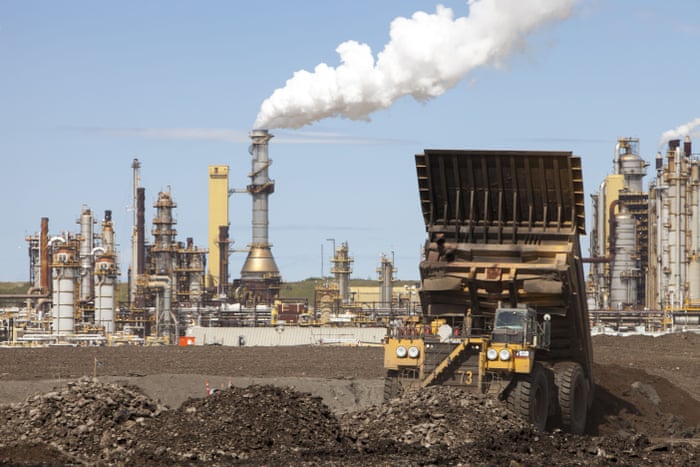Extraction also causes 80% of biodiversity loss, according to comprehensive UN study.
Extractive industries are responsible for half of the world’s carbon emissions and more than 80% of biodiversity loss, according to the most comprehensive environmental tally undertaken of mining and farming.
While this is crucial for food, fuel and minerals, the study by UN Environment warns the increasing material weight of the world’s economies is putting a more dangerous level of stress on the climate and natural life-support systems than previously thought.
Resources are being extracted from the planet three times faster than in 1970, even though the population has only doubled in that time, according to the Global Resources Outlook, which was released in Nairobi on Tuesday.
Each year, the world consumes more than 92b tonnes of materials – biomass (mostly food), metals, fossil fuels and minerals – and this figure is growing at the rate of 3.2% per year.

Massive dump trucks by the Syncrude upgrader plant, Canada. The tar sands are the largest industrial project on the planet, and the world’s most environmentally destructive. Photograph: Rex/Shutterstock
Since 1970, extraction of of fossil fuels (coal, oil and gas) has increased from 6bn tonnes to 15bn tonnes, metals have risen by 2.7% a year, other minerals (particularly sand and gravel for concrete) have surged nearly fivefold from 9bn to 44bn tonnes, and biomass harvests have gone up from 9bn to 24bn tonnes.
Continue reading at: Resource extraction responsible for half world’s carbon emissions | Environment | The Guardian
Extractive industries are responsible for half of the world’s carbon emissions and more than 80% of biodiversity loss, according to the most comprehensive environmental tally undertaken of mining and farming.
While this is crucial for food, fuel and minerals, the study by UN Environment warns the increasing material weight of the world’s economies is putting a more dangerous level of stress on the climate and natural life-support systems than previously thought.
Resources are being extracted from the planet three times faster than in 1970, even though the population has only doubled in that time, according to the Global Resources Outlook, which was released in Nairobi on Tuesday.
Each year, the world consumes more than 92b tonnes of materials – biomass (mostly food), metals, fossil fuels and minerals – and this figure is growing at the rate of 3.2% per year.

Massive dump trucks by the Syncrude upgrader plant, Canada. The tar sands are the largest industrial project on the planet, and the world’s most environmentally destructive. Photograph: Rex/Shutterstock
Since 1970, extraction of of fossil fuels (coal, oil and gas) has increased from 6bn tonnes to 15bn tonnes, metals have risen by 2.7% a year, other minerals (particularly sand and gravel for concrete) have surged nearly fivefold from 9bn to 44bn tonnes, and biomass harvests have gone up from 9bn to 24bn tonnes.
Continue reading at: Resource extraction responsible for half world’s carbon emissions | Environment | The Guardian

No comments:
Post a Comment